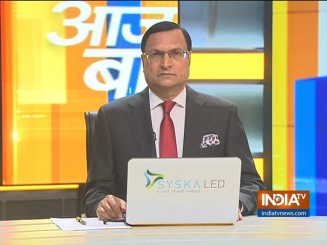 In the first major electoral exercise conducted in Jammu and Kashmir since the nullification of Article 370 on August 5 last year, the people of Kashmir passed a significant test to tell the world that democracy is thriving in the Valley. While the BJP emerged as the single largest party in the first ever District Development Council elections in many districts of Jammu region, it made significant inroads for the first time in history in the Valley.
In the first major electoral exercise conducted in Jammu and Kashmir since the nullification of Article 370 on August 5 last year, the people of Kashmir passed a significant test to tell the world that democracy is thriving in the Valley. While the BJP emerged as the single largest party in the first ever District Development Council elections in many districts of Jammu region, it made significant inroads for the first time in history in the Valley.
The People’s Alliance for Gupkar Declaration, called the Gupkar Alliance consisting of seven parties including Farooq Abdullah’s National Conference and Mehbooba Mufti’s People’s Democratic Party, gained significant lead in the valley, with a large number of independents holding the key to the councils.
Now that the people’s verdict has come, no one can now allege that elections were not free and fair. The people in the Valley cast their votes in large numbers without any fear, the political parties contested without any hindrance, and after the results were out, not a single major leader had any complaint about the holding of free and fair polls.
The Gupkar Alliance, which was aiming at sweeping the DDC elections, failed to score a majority. The BJP contested on its own, and won three seats in Kashmir Valley, while it won 53 seats in Jammu region. In many constituencies in the Valley, the BJP lost by slender margins. The surprising element was the number of independent candidates who won. They went to the voters and promised them good roads, hospitals, schools and clean drinking water, and in return, the people trusted them.
To sum up, democracy was the winner. Due to threats from terrorists, the polling was held in eight phases. In places like Kulgam, there was 60 to 70 per cent polling, a thing that was unheard of in recent times. People bravely came out of their homes and voted despite threats from separatists and terrorists. There were celebrations after candidates won in the Valley.
This is indicative of the trust reposed by the people of Kashmir in the democratic and political process. The common voter in Kashmir has taught a lesson to the doomsdayers and naysayers who were working on an agenda scripted by their masters from across the border. The common voters, mainly women, spoke out openly when they went to vote. They spoke about their essential needs: for electricity, water, schools, roads and hospitals. A new party, Jammu Kashmir Apni Party, emerged from among the people. This party was formed after the nullification of Article 370.
The very fact that the senior leaders of National Conference and PDP have admitted that the elections were free and fair, is a feather in the cap of Prime Minister Narendra Modi, whose government had promised to bring grassroots democracy at the earliest in Jammu and Kashmir. The common people were fed up of frequent bandh calls given by separatists almost every day. They were also unhappy with incidents of stoning by youths at security forces without any provocation.
After Article 370 was nullified and Jammu and Kashmir was declared a Union Territory, rural roads were constructed at the pace of 30 kilometres per day from August 7, 2019 to October, 2020. Under the PM Rural Roads Scheme, 212 rural roads and 38 small bridges were built. Smart classes have been built and are ready for use in many government schools. At least 40 small and big power projects have been launched.
Of course, much needs to be done. Hospitals and primary health centres will have to be built and many homes still do not have power connections. Cinema halls are defunct. The common people are still waiting for reliable 4G communication.
It is the responsibility of the Centre and the Union Territory administration to ensure that development and welfare schemes are launched at the earliest. It does not matter which political party is in power in the District Development Council, whether NC, or PDP, of BJP, or Congress, their leaders must join hands to bring peace and progress in the valley. That will be the ultimate victory for both democracy and for the people of Kashmir.